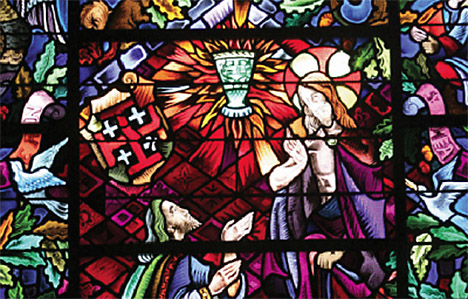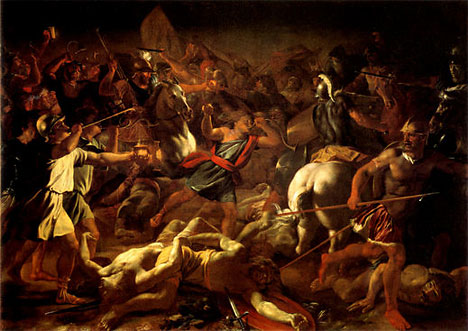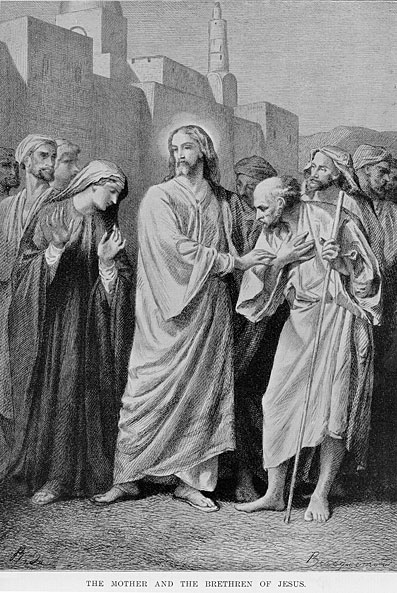Jul
8
2015

“By the imperative, time is formed into a cup, still empty but formed for the special purpose of being filled with the content demanded by the order.”
The Imperative Comes First
Essay by John Barach
As many people have pointed out, in Christian ethics, the indicative precedes the imperative. First God says, “I am Yahweh your God, who brought you out of the land of Egypt, out of the house of bondage,” and then he gives the Ten Words (“You shall have no other gods before me…”). First Paul tells us what Christ has done and who we are in Christ, and then he summons us to act accordingly. First comes the good news of what God has done for us and then comes the summons to respond in faith and love and new obedience.
Continue reading
Comments Off | tags: Covenant Theology, Eugen Rosenstock-Huessy, John Barach, Ten Commandments | posted in Biblical Theology, Creation, Quotes
Jun
20
2011

What do the Psalms mean when they speak of the Lord “bowing the heavens”?
“Bow thy heavens, O Lord, and come down: touch the mountains, and they shall smoke.” (Psalm 144:5)
“He bowed the heavens and came down; thick darkness was under his feet.” (Psalm 18:9)
The language is architectural, based on the original and greatest Temple of them all, the cosmic “house” constructed in Genesis 1.
This post has been slain and resurrected for inclusion in my 2015 book of essays, Inquietude.
Continue reading
13 comments | tags: Baptism, Communion, Covenant curse, Covenant Theology, Crystal Sea, Exodus, John Barach, Revelation, Sinai, Tabernacle | posted in Bible Matrix, Biblical Theology
May
10
2011
Here’s a snippet from John Barach’s review of Lou Priolo’s The Heart of Anger: Practical Help for the Prevention and Cure of Anger in Children:
Priolo presents two family models, inviting you to determine which one best matches your family.
Continue reading
Comments Off | tags: John Barach | posted in Christian Life, Quotes
Mar
31
2011

or The Disunited State of Samaria
“…and they are seven kings;
five have fallen,
one is,
the other has not yet come;
and when he comes,
he must remain a little while.” (Revelation 17:10)
Time for another weird one. Although it’s probably only weird to the conservative evangelical Bible scholars among us. [1]
Albert’s post on marriage the other day allows us to see the context of the sin of the Samaritan woman. James Jordan observes that this woman was most likely a victim of this unjust system, hence the other Samaritans’ readiness to believe her testimony.
Continue reading
4 comments | tags: John, John Barach, Ralph Smith, Revelation, Typology, Warren Gage | posted in Biblical Theology, Quotes
Apr
20
2010

From John Barach’s blog:
In the introduction to the sixth volume of G. K. Chesterton’s Collected Works, while working toward some explanation of The Man Who Was Thursday, Denis Conlon quotes Chesterton’s Introduction to the Book of Job (1907):
Continue reading
Comments Off | tags: Chesterton, Job, John Barach, Leviathan | posted in Biblical Theology
Dec
10
2009

or The First Shall Be Last
Yesterday’s post concerning Jesus’ message to John had some discussion about lepers becoming New Covenant priests. Those who were condemned to live outside were made clean and invited in. Of course, there is Jesus’ own condemnation of those who watched harlots and tax collectors enter the kingdom but defiantly stood outside themselves.
Right up until the end of the Jewish war, the Jewish leadership got their clean and unclean, their inside and outside, more and more wrong. The gospel turned their world upside down–or, in fact, rightside up.
John Barach observes how Mark applies this to Jesus’ own family using literary structure: Continue reading
Comments Off | tags: John Barach, Literary Structure, Mark | posted in Biblical Theology, Quotes, The Last Days
Jul
27
2009
or Jesus and the Stickybeaks
John Barach writes:
In Mark 13:32, Jesus says, “Of that day and hour no one knows, not even the angels in heaven, nor the Son, but only the Father” (cf. Matt. 24:36). That’s somewhat puzzling. Is it a limitation on Jesus’ omniscience, as if God the Father knows things that God the Son doesn’t? That can’t be. So is it saying that Jesus as a man doesn’t know things that God the Son knows? Even so, that’s still puzzling.
Continue reading
1 comment | tags: Dispensationalism, John Barach | posted in Biblical Theology, The Last Days






























